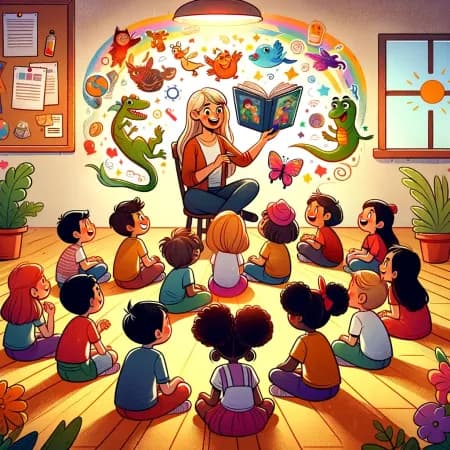The Impact of Storytelling on Education

Category: Uncategorized
Created At: 2024-03-12
“Stories are central to human cognition and communication. We engage with others through stories, and storytelling is a lot more than just a recitation of facts and events. As human beings, we are automatically drawn to stories because we see ourselves reflected in them.” - Tom Corson-Knowles.
Whether it’s before bedtime or sitting together as family and friends, storytelling has always been an essential part of life. We love hearing and telling stories, especially as children.
It’s no wonder then that so much of life is about storytelling as well. Leaders in fields like sports, business & politics often mention how storytelling is one of the most powerful means to influence and inspire.
But what is not so well known is the impact of storytelling on education. It has been proven that children have higher educational outcomes when they are taught through stories. This makes the storytelling technique to be one of the most effective teaching strategies.
Some of the known benefits of storytelling as a learning approach are:
Higher Motivation & Active Participation
Storytelling ignites the natural curiosity and open-mindedness of children. They relate to story times as one of fun and exploration rather than educational tasks or outcomes.
Boost Creativity & Attention Spans
Storytelling captivates children’s imaginations, making learning an engaging and enjoyable process. When stories are told, children visualize the scenes, characters, and actions, activating their imaginations. If children themselves are making stories this really enhances the experience.
Deepened Learning & Knowledge Retention
By presenting educational content within a story, children are more likely to absorb and retain information, as they can contextualize it within their imaginative constructs.
Increased Literacy & Critical Thinking Skills
Storytelling is well known for its success in developing a love of language and vocabulary, contributing to the development of literacy across learning. In schools where improving basic literacy levels is a priority, storytelling can be used to quickly raise standards while developing skills, knowledge and confidence in a range of other areas. The imaginative play is crucial for cognitive development, as it encourages creative thinking and problem-solving skills.
Social Emotional Intelligence Development
Stories often depict characters facing challenges, experiencing emotions, and navigating complex relationships. By identifying with characters, children learn to empathize with others, understanding emotions from different perspectives. This emotional engagement not only makes the learning experience more memorable but also helps in the development of emotional intelligence. Emotional intelligence is critical for children’s social development, as it enables them to recognize and manage their emotions, understand others' feelings, and navigate social situations effectively.
